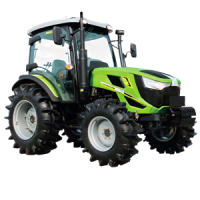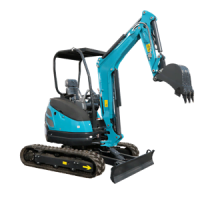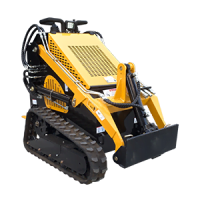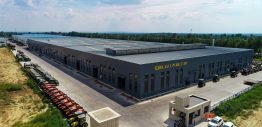In an age where environmental sustainability is of paramount importance, the agricultural industry faces a pivotal challenge: how to meet the growing global demand for food while minimizing its ecological footprint. Farm tractors, the workhorses of modern agriculture, play a crucial role in this endeavor. In this comprehensive article, we will delve into the multifaceted role of farm tractors in sustainable farming practices, shedding light on their impact on efficiency, conservation, and eco-friendliness.
Introduction
Farm tractors are synonymous with agriculture, serving as indispensable tools for farmers worldwide. While they have come a long way from their humble origins, the modern farm tractor is not just a symbol of agricultural progress but also a key driver of sustainable farming practices.
The Imperative of Sustainable Agriculture
Before delving into the specifics of farm tractors’ role in sustainability, it’s essential to understand the pressing need for sustainable agricultural practices.
Agricultural Challenges
Agriculture faces myriad challenges, including soil degradation, water scarcity, loss of biodiversity, and climate change. Sustainable practices aim to address these issues while ensuring food security.
The Role of Technology
Technology, including advanced farm tractors, plays a pivotal role in shaping the sustainability landscape of agriculture. These machines have evolved to meet the demands of eco-conscious farming.
Efficiency and Sustainable Farming
Farm tractors contribute significantly to the efficiency of farming operations, which is a cornerstone of sustainable agriculture.
L'agriculture de précision
GPS-Guided Precision
Modern tractors are equipped with GPS technology, enabling precision farming techniques. They can follow predefined paths with centimeter-level accuracy, minimizing resource wastage and enhancing efficiency.
Data-Driven Decisions
Farm tractors equipped with sensors collect real-time data on soil conditions, moisture levels, and crop health. This data empowers farmers to make informed decisions about planting, irrigation, and fertilization, ultimately improving resource management.
Labor Efficiency
Reduced Manual Labor
Farm tractors have significantly reduced the need for manual labor in agriculture. Fewer human hands are required for tasks such as plowing, planting, and harvesting, which can lead to labor cost savings.
Skilled Labor Allocation
Automation of routine tasks by tractors allows skilled labor to focus on more specialized aspects of farming, such as crop management and sustainable practices.
Conservation and Sustainable Farming
Farm tractors also play a pivotal role in conservation efforts within sustainable farming.
Soil Health
Reduced Soil Compaction
Modern tractors are designed to be gentler on the soil, reducing compaction that can lead to soil degradation. This preservation of soil health is fundamental to sustainable farming.
Travail du sol de conservation
Tractors equipped with conservation tillage implements help farmers reduce the need for intensive plowing, minimizing soil disturbance and erosion.
Gestion de l'eau
Precise Irrigation
Tractors with precision technology optimize irrigation, delivering the right amount of water to crops. This conserves water resources and prevents over-irrigation, which can lead to soil salinity and waste.
Erosion Control
Tractors are used to implement erosion control measures such as contour farming and terracing, helping to protect soil and prevent runoff.
Eco-Friendliness and Sustainable Farming
Farm tractors have also evolved to be more environmentally friendly, aligning with the principles of sustainable farming.
Alternative Fuels
Tracteurs électriques
Electric farm tractors are gaining popularity as eco-friendly alternatives. They produce zero emissions, reduce air pollution, and can be charged with renewable energy sources.
Biofuels
Some tractors run on biofuels made from renewable resources like crops or agricultural waste, further reducing their carbon footprint.
Reduced Chemical Usage
Application de précision
Tractors equipped with precision technology can apply fertilizers and pesticides with pinpoint accuracy, reducing chemical usage and its impact on the environment.
Défis et considérations
While farm tractors contribute significantly to sustainable farming, several challenges and considerations must be addressed.
Cost of Sustainability
Initial Investment
Implementing sustainable farming practices, including advanced tractor technology, can involve higher upfront costs for farmers. Government incentives and support may be necessary to facilitate adoption.
Education and Training
Technical Know-How
Farmers need training to effectively utilize advanced tractor features and sustainable practices. Educational initiatives can bridge the knowledge gap.
Infrastructure
Charging and Maintenance
For electric tractors, a robust charging infrastructure is needed in rural areas. Additionally, maintenance and support systems must be in place to ensure uninterrupted operations.
FAQ
How do precision farming techniques improve sustainability?
Precision farming techniques, enabled by tractors, improve sustainability by optimizing resource use, reducing waste, and minimizing environmental impact. This leads to more efficient and eco-friendly agriculture.
Are electric tractors suitable for all farming operations?
Electric tractors are suitable for many farming operations, especially those with access to charging infrastructure. However, their range and charging time may limit their use in some large-scale or remote settings.
What role does government policy play in promoting sustainable farming with tracteurs?
Government policies, including incentives, subsidies, and regulations, can significantly influence the adoption of sustainable farming practices and advanced tractor technology.
Can small-scale farmers benefit from advanced tractor technology?
Yes, small-scale farmers can benefit from advanced tractor technology through cooperative ownership, leasing programs, or government support initiatives that make eco-friendly tractors more accessible.
How can sustainable farming benefit the environment beyond agriculture?
Sustainable farming practices benefit the environment by reducing greenhouse gas emissions, conserving soil and water resources, and promoting biodiversity. These practices contribute to broader environmental conservation efforts beyond the agricultural sector.
Conclusion
Farm tractors are integral to sustainable farming practices, playing a pivotal role in enhancing efficiency, conservation, and eco-friendliness in agriculture. Their evolution from basic machines to high-tech, environmentally conscious tools reflects the agricultural industry’s commitment to meeting the dual challenge of food security and environmental stewardship. As the world strives for a more sustainable future, farm tractors will continue to drive the transformation of farming practices towards greater efficiency, conservation, and eco-friendliness, ultimately contributing to a healthier planet for all.







-1.png)